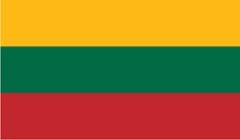
The Holocaust in the Baltic nation of Lithuania exacted a greater toll on Jews than in nearly any other Nazi-occupied country, with more than 90 percent of its Jewish citizens having been murdered by Lithuanian antisemites and German forces.
Out of a pre-war Jewish population of about 208,000, upwards of 195,000 Litvaks, or Lithuania Jews, were killed. Incredibly enough, the murder rate of Jews in Lithuania surpassed that of neighboring Poland, a fact that staggers the imagination. Only in Latvia and Greece was the percentage as shockingly high.
The genocide in Lithuania was discussed and dissected at a symposium on Nov. 24 presented by the University of Toronto’s Centre for Jewish Studies and the embassy of the Republic of Lithuania in Canada.
To probably no one’s surprise, the director of the Centre for Jewish Studies, Jeffrey Kopstein, as well as a Lithuanian diplomat who delivered opening remarks, both described the topic under discussion as “difficult.”
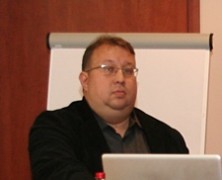
As Jonas Skardinskas, the minister plenipotentiary of Lithuania’s embassy in Ottawa, observed, “There are very few people in Lithuania who were not touched by the Holocaust.”
He added, “There is no denying that it evokes raw emotions.”
Filling in for the Lithuanian ambassador, who was unable to attend due to pressing diplomatic business, Skardinskas called the Holocaust a “painful and tragic” chapter in Lithuania’s often tortured history of foreign domination and shifting alliances.
Saying that Jewish history and culture should occupy an important segment of Lithuania’s historic narrative, he reported that schools in Lithuania since the advent of national independence in 1990 have incorporated courses on Jews and the Holocaust into the curriculum, and that a new generation of historians has brought the shoah to public attention.
More remains to be done, he acknowledged, but Lithuania will continue on “the path of honest recognition of the past.”
Salius Suziedelis, a Lithuanian American scholar and a former editor of the Journal of Baltic Studies, said that the Holocaust was the “bloodiest page” in Lithuania’s history, and that nothing in its past had prepared it for such a catastrophe.
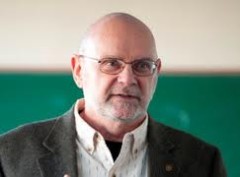
He did point out, however, that Catholic antisemitism was not an alien phenomenon in Lithuanian society prior to the Nazi invasion in 1941.
For Lithuanians, the Nazi interregnum was not the worst period of their lives, he said, pointing out that more ethnic Lithuanians were killed after the war, under Soviet rule, than during the German occupation.
Lithuanians, having abruptly lost their independence after the invasion by the Soviet Union in 1940, hoped that Germany would restore the sovereignty they had enjoyed since the end of World War I. To their bitter disappointment, the Germans treated Lithuania like a conquered colony.
Suggesting that wartime antisemitism in Lithuania was in part fanned by the widespread and twisted belief that Jews were communists, Suziedelis said he wanted to set the record straight.
Although a disproportionate percentage of Communist party membership was composed of Jews, the vast majority of Jews opposed communism. And while Lithuanians thought that the party`s leadership was made up primarily of Jews, the truth was that ethnic Russians and Poles had assumed those positions by the late 1930s, noted Suziedelis, a professor emeritus of history at Millersville University in Pennsylvania.
In a blunt declaration, he asserted that Lithuanians should come to “an honest understanding” that Lithuanians from all classes and walks of life, rather than only criminals, had participated in anti-Jewish massacres in the summer of 1941.
Since the end of the war, three distinct narratives of the Holocaust have emerged in Lithuania, he noted.
The Soviet version glossed over it and claimed that Lithuanian perpetrators had been “bourgeois nationalists.” Western narratives, their political slant notwithstanding, were tainted by the writers’ ignorance of the Lithuanian language. Lithuanian narratives, often produced by emigres outside the country, were biased and incomplete, having been corrupted by antisemitic animus and a refusal to admit that Lithuanian nationalists had been among the murderers.
The Holocaust did not occupy a central place in the Lithuanian imagination during the Soviet epoch, but the situation has begun to change since 1990, Suziedelis said. As he put it, “Progress has been made.”
Lithuanian academics specializing in the Holocaust have produced a body of work that remains largely unknown in North America, he also pointed out.
Sara Ginaite, a Jewish survivor of the Holocaust in Lithuania and a former professor of political economy at Vilnius University, charged that the Lithuanian Activist Front (LAF), a resistance movement formed to combat the 1940 Soviet occupation, was deeply antisemitic. LAF established the short-lived Lithuanian provisional government, which assumed power on June 24, 1941, two days after Germany invaded Lithuania.
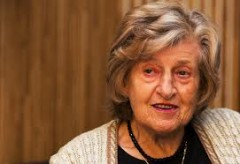
Under this regime, she said, Jews were stripped of their civil rights and their right to live in Lithuania. The provisional government also established camps like Seventh Fort and Ninth Fort, where Jews were killed, and issued a proclamation that “public executions of Jews should be avoided.”
Ginaite, a partisan during the war, talked at length about two antisemitic pogroms in Kaunas in June 1941 perpetrated by Lithuanian para-military forces. She claimed that the provisional government shares responsibility for what happened in Kaunas, her home town.
The pogroms were a “clear signal” to the Germans that Lithuania was a place where Jews could be exterminated at will, she said, adding that the killings took place at 152 sites throughout the country.
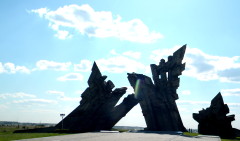
In her estimation, 80 percent of Lithuanian Jews who perished died at the hands of Lithuanians.
Christoph Dieckmann, a lecturer in modern European history at Keele University in Britain and the author of a two-volume work in German on the Holocaust in Lithuania, said it was “a German initiative, even though other people were involved.”
The pogroms in Kaunas, he said, were initiated by the Germans, with German police having taken part in them. He added that mass killings of Jews in Lithuania did not occur until the arrival of the Germans.
Dieckmann said that conservatives and radical nationalists were in the forefront of the Lithuanian provisional government, and that these nationalists comprised the ranks of pogromists. They were convinced that Jews were communists and that their removal or elimination would be beneficial to the cause of Lithuanian independence.
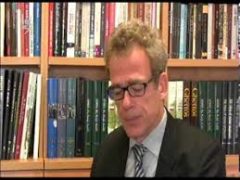
For such Lithuanians, the enemy was the Soviet Union rather than Germany, he noted.
Although Lithuanians mounted protests against certain aspects of Nazi policy, they remained silent on Jewish issues, he said.
Nonetheless, some Lithuanians saved Jews, judging by Yad Vashem’s decision to confer the honor of Righteous Gentile on several hundred Lithuanians.
